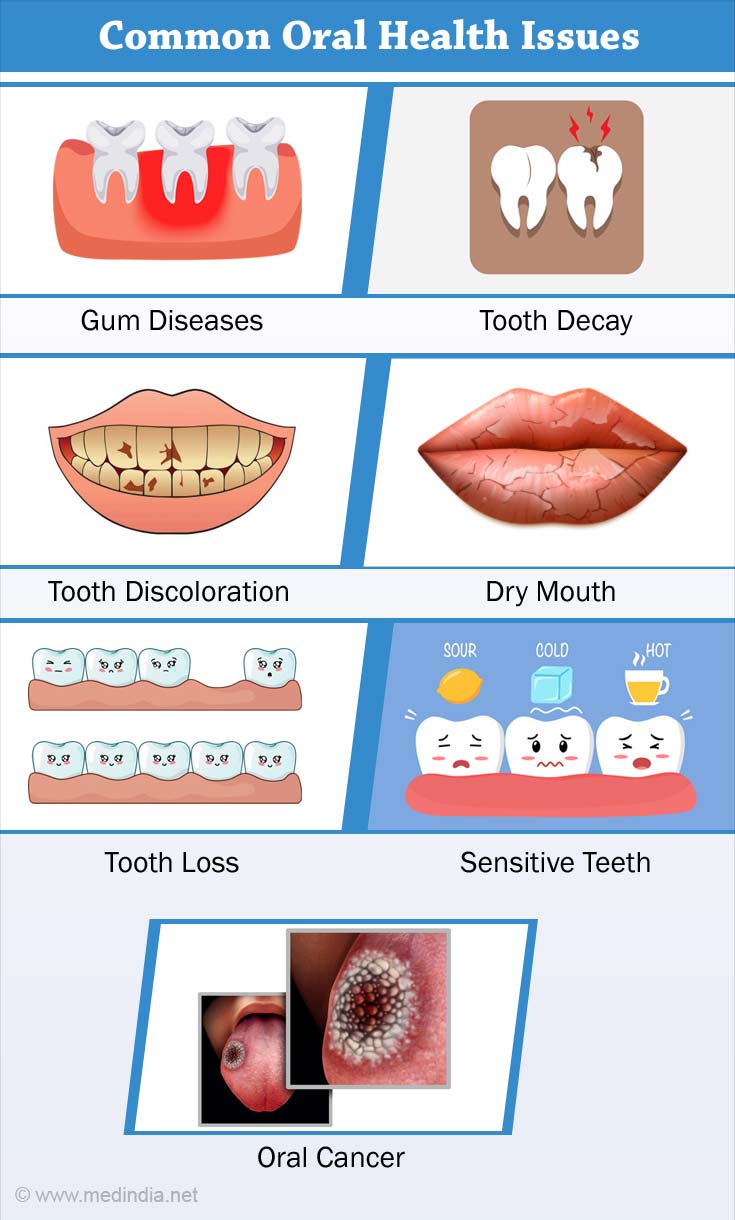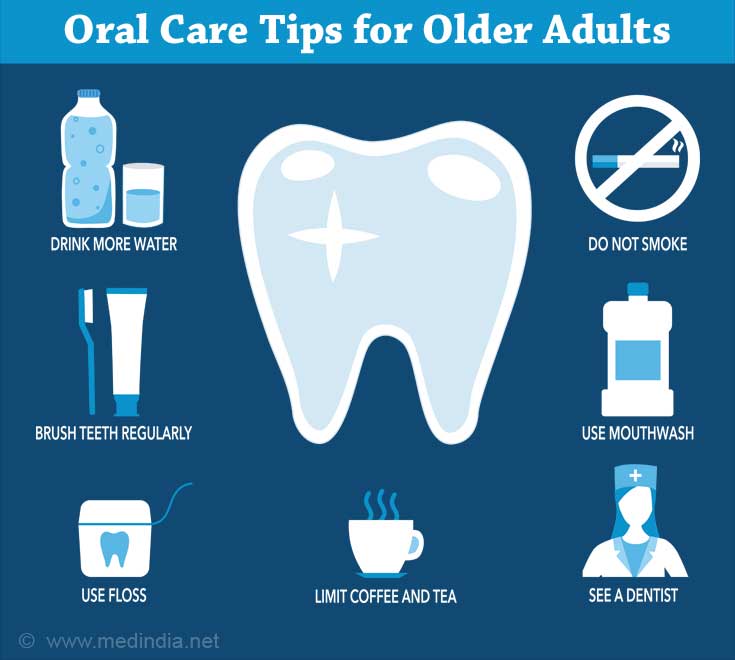- Oral Health - (https://www.who.int/health-topics/oral-health#tab=tab_1)
- Oral Health Tips - (https://www.cdc.gov/oralhealth/basics/adult-oral-health/tips.html)
- Taking Care of Your Teeth and Mouth - (https://www.nia.nih.gov/health/taking-care-your-teeth-and-mouth)
- Oral Health Topics - (https://www.ada.org/en/member-center/oral-health-topics/home-care)
Aging and Oral Health
Teeth care and oral health hygiene should be given more importance during aging. The common misconception is that losing teeth during old age is inevitable. This is not true. If cared properly, your teeth and smile can last lifelong.
Even in the absence of known medical problems, natural wear and tear can recede gums and expose teeth to decay. According to the Centers for Disease Control and Prevention (CDC), 34 percent of U.S. adults aged 65 and older have lost more teeth to gum disease and tooth decay.
During aging, mouth size changes along with tooth nerve becoming smaller and making the teeth less sensitive to decay and other dental problems.
Strong teeth also pave way for adequate nutrient uptake via improved chewing and digestion that ultimately results in reduced comorbidities and prolonged lifespan.
One can have strong teeth even in their later years by following a strict tooth and mouth care regimen with the aid of dentist.
Importance of Oral Care
The affiliation between the mouth and the rest of body can lead to healthy life in later years. Uncontrolled diabetes mellitus damages the blood supply to tooth resulting in gum diseases, which in turn increases the body’s resistance to insulin leading to increased blood sugar levels. Complete or partial tooth loss in elderly people has a direct impact on their dietary habits, health, and mental well-being as it affects both esthetics and food consumption.
The branch of dentistry that deals with the diagnosis, prevention, and treatment of dental problems in aged people is known as “Gerodontology.”
Oral Health Concerns for Aging Adults
The listed below are the common oral health issues that require more attention as you age.

- Gum Diseases – Gum recede more as age advances which make tooth root more vulnerable to cavities. The CDC reports that about two in three adults aged 65 years or older have gum disease. This condition begins with swollen, red, or bleeding gums and progresses to tooth loss.
- Tooth Decay – teeth undergo wear and tear with increased age, which make them more sensitive to caries causing micro-organisms. It can be prevented by effective good oral hygiene habits along with regular dental checkup.
- Tooth Discoloration – Changes in outer tooth structure and long-term consumption of stain-causing foods and beverages can contribute to tooth discoloration. If you have dark teeth, it could be an indication of a more serious problem, which requires professional cleaning by the dentist.
- Dry Mouth – Aging along with certain medications, chronic diseases and long-term use of dentures cause dry mouth. A dry mouth also increases the decay risk. Consult with a dentist for restoring moisture to your mouth, and also ask your physician to find a medicine or dosage that doesn't dry up the mouth.
- Diminished Taste – Advancing age impairs the sense of taste or loss of taste sensation along with diseases, medications, and dentures.
- Tooth Loss– Untreated gum disease can increase the risk of tooth loss in old age.
- Uneven jaw bone – Lost teeth should be replaced within three to six months or else it leads to shifting of adjacent teeth into open spacing leading to difficulty in chewing and uneven jaw bone.
- Sensitive Teeth – Gum recession and weakened tooth structure issues in old age make sensitivity an age-related dental problem. Use an anti-sensitivity toothpaste if you experience sensitivity to hot, cold, or sweet foods. However, if the problem persists, consult your dentist because it could indicate a more serious problem such as tooth fracture or decay.
- Denture-induced problems – Maintaining a poor oral hygiene and ill-fitting dentures leads to accumulation of fungus called Candida albicans, which causes redness or swelling of tissue underneath the denture and predisposes to oral cancer.
- Oral Cancer – Oral cancer commonly occurs in older adults. Though pain is not usually an early symptom of the disease, regular dental check-ups can screen for oral cancer. Even if you no longer have your natural teeth, you should still visit your dentist regularly.
- Thrush – Thrush is an oral fungal infection that occurs due to the overgrowth of Candida albicans in the mouth of older people with low immunity. It appears as a white, raised growth that can look like cottage cheese. When it becomes irritated, it can cause mouth pain and redness.
Impact of Other Diseases
Other diseases that commonly occur in older adults can also have an impact on oral health. People diagnosed with
Osteoporosis is another common disease that causes the bones in the body to lose density. When the bone density in the jaw bone decreases, teeth can become loose.
Dental x-rays in regular dental check-ups can help screen for osteoporosis, as dentists can use them to help identify those with lower bone density. This is another reason to visit the dentist regularly as you age.
Arthritis in the hands and fingers can make brushing or flossing teeth difficult to perform.
Oral Care Tips for Older Adults
Just because older individuals are susceptible to certain dental health issues does not mean that they will surely experience them in the future. Keeping oral health in optimal condition requires several common dental practices.
Here are some oral care tips for seniors to help keep their oral health in top shape:

- Brush and Floss Daily – Brush your teeth twice daily using fluoride toothpaste regularly. Floss the area between your teeth for atleast once a day to remove stuck food particles. For elderly people with no teeth, oral hygiene can be maintained by using soft clean cloth to remove the plaque out of the oral cavity.
- Use an Antibacterial Mouthwash – Rinse the mouth with an antibacterial mouthwash after brushing or flossing your teeth to kill harmful bacteria and prevent plaque buildup.
- Increase Fluoridation – Fluoride strengthens your teeth and protects the outer tooth structure. Dentists encourage older adults who are at risk of tooth cavities to switch to a fluoride toothpaste or incorporate a fluoride rinse into their day-to-day oral hygiene routine.
- Avoid Tobacco Products – Using tobacco products can cause tooth discoloration, decay, increase the risk of gum disease and oral cancer.
- Control Sugar Intake – Avoid candy, soda, soft-drinks, and starchy food to prevent the accumulation of plaque and tartar.
- Drink More Water – Increased water intake not only prevents tooth decay by rinsing the bacteria and food particles out of the oral cavity, it also neutralizes the acid in the mouth thereby reducing the incidence of decay.
- Proper Denture Care – Dentures that offer a long-term solution to missing teeth in older people requires special care. Follow all instructions given by your dentist for taking caring of dentures, including cleaning them daily, storing them in water overnight, brushing them before you insert, watching for signs of redness or swelling, and letting your dentist know immediately if your dentures are uncomfortable.
- Calcium Supplements – Calcium keeps your teeth healthy as you age. Physicians recommend older adults to take 1,000 milligrams of calcium daily from low-fat dairy products to minimize their risk of osteoporosis, a condition that has a significant impact on the jaw bone that supports the teeth.
- Watch Out for Side-Effects of Medication – Some medications may cause oral health issues, such as a dry mouth and altered taste sensation. If you are on medication, make sure to keep tabs on the changes in your mouth and consult your dentist as soon as possible.
- Visit Your Dentist Regularly – Denture wearers must visit their dentist to get their mouth, teeth, and gum checked every 6 months and keep one step ahead of potential oral health issues.
Proper oral hygiene habits along with regular dental visits, and making adjustments to your routine as your body changes can keep your smile bright and healthy at any age.
Understanding the dental risks that come with aging, you and your dentist can work together to help prevent any oral health problems.











